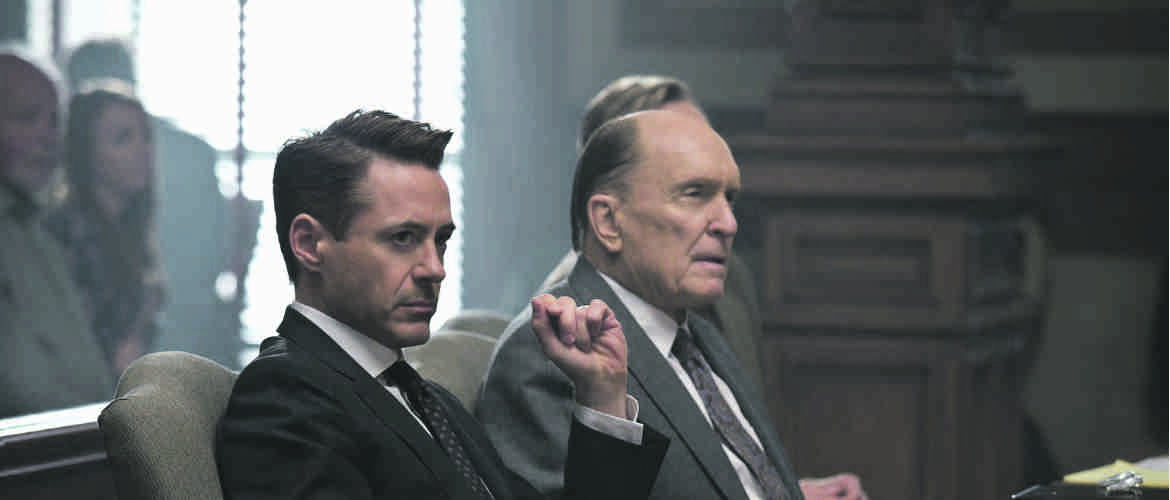By JAKE COYLE
AP Film Writer
Just put Robert Downey Jr. and Robert Duvall in a room together and you’ll have a movie, a truism that The Judge does its damnedest to disprove.
David Dobkin’s film doesn’t leave a melodramatic stone unturned, adding to its courtroom drama a sentimental tsunami of story lines: a mother’s funeral, a father-son reckoning, a fight with cancer, a dash of alcoholism, a custody battle, a mentally challenged younger brother, and a hint of possible incest, to boot. Objection! Badgering the moviegoer.
But for a moment, the big-budget sheen of The Judge and its contrived, kitchen-sink emotionality is forgotten. Downey’s big-city, high-priced lawyer, Hank Palmer, helps his ailing father, Duvall’s Judge Joseph Palmer, in an excrement-soiled bathroom, pulling him into the shower while they both struggle for an excuse to keep Hank’s young daughter outside.
Even with the scene’s gratuitous realism, it’s the one natural moment in the otherwise schematic The Judge. As it is, the considerable appeal of seeing two fine actors as perfectly opposite each other like Duvall and Downey — one a rigid old cowboy, the other a manic pinball — is limited by the film’s ceaseless heart string-pulling. This is a movie that uses Bon Iver’s mawkish Holocene not once, but twice.
Hank is a glib Chicago defense attorney (“innocent people can’t afford me”) who returns to his Indiana hometown for his mother’s funeral and a reluctant reunion with his domineering father, from whom he’s long been estranged. Despite being a community pillar, Judge Palmer is arrested for running over and killing a man he once put in jail.
Hank defends him, along with a sheepish local lawyer (Dax Shepard) against a severe prosecutor (Billy Bob Thornton). The case is less the driver of the story than the frame for Hank’s return to his roots (Vincent D’Onofrio and Jeremy Strong play his brothers, Vera Farmiga his ex-girlfriend) and bonding with his father.
Duvall (who perhaps ought to have had more scenes dishing out justice on the bench in a movie called The Judge) is in his wheelhouse, playing a tough-talking, joke-dishing old man, but one haunted by regret and humbled by encroaching old age.
Downey, too, is in typical form, though he’s never much tested to go beyond his easy, hyper-verbal charm. But his live-wire act remains a thing to behold. Where one actor reacts once, Downey reacts half-a-dozen times, alert to every word and gesture.
Seemingly anxious that in today’s cinema there’s no place for a simple courtroom drama or a coming-home tale, The Judge fuses the two together. This is, after all, Downey’s first drama since 2009’s The Soloist; he’s had Iron Man and Sherlock Holmes franchises to attend to.
Dobkin (largely a director of broad comedies like Wedding Crashers) won’t rest his constantly moving, always swooping camera. Large portions of the movie are over-lit by cinematographer Janusz Kaminski, who has shot some beautiful movies Lincoln, The Diving Bell and the Butterfly), but his penchant for flares and blown-out windows here gives the film an artificial flatness.
If in eight years, Downey’s dramatic output amounts to The Judge and The Soloist, we can only feel that something is being squandered. Instead, we get a perpetually watchable film in that lazy-afternoon-cable-movie kind of way. If The Judge proves anything, it’s that talented, likable actors like Downey, Duvall, D’Onofrio and Farmiga can keep a mediocre movie humming.













No Comment